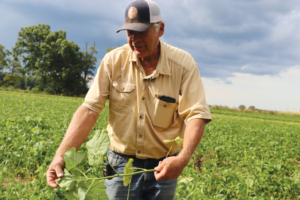Jan 27, 2023
New publication provides organic transition information
Farmers and ranchers interested in organic certification have a new resource — a federal publication with information on practice areas and transitioning strategies.
Sustainable Agriculture Research and Education, funded by the U.S. Department of Agriculture’s National Institute of Food and Agriculture, recently published Transitioning to Organic Production. The publication provides information on practice areas including crop rotation, cover cropping, adding organic fertility sources, disease prevention, integrated pest and weed management, conservation tillage, soil management and incorporating biodiversity.

“Transitioning to Organic Production provides critical information and resources for producers interested in making significant changes in their production practices,” said Vance Owens, national program leader with NIFA’s Institute of Food Production and Sustainability. “This new publication is one of many published by the SARE program that provides producers and the general public with information about farming and ranching sustainably.”
Transitioning to Organic Production also includes sections on transitioning strategies relevant to specific systems, including livestock, field crop and horticulture operations, as well as information about general transition strategies, available resources, business planning and risk management.
The organic industry is the fastest-growing segment of U.S. agriculture, with U.S. total sales of food and non-food products reaching $57.5 billion in 2021, according to the USDA.
American farmers and ranchers alone sold $11.2 billion in certified organic commodities in 2021, according to a recent survey by the National Agricultural Statistics Service. During the same time, there were 17,445 certified organic farms.









